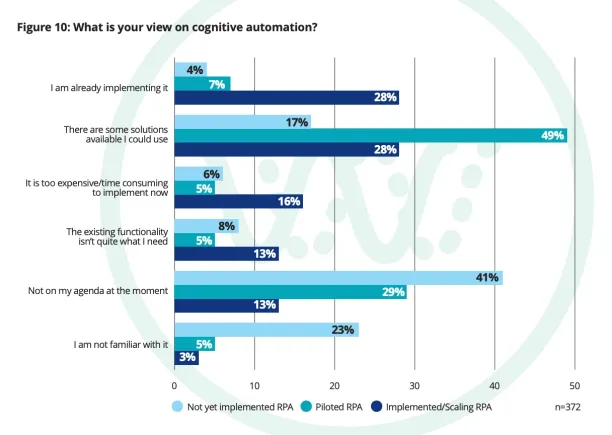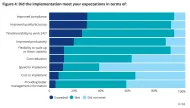Top 4 Cost-Effective RPA Tools Under $2,000 in 2024
Robotic Process Automation (RPA) automates companies’ time-consuming and repetitive tasks across different business functions. Automated processes, then:
- Free up employees’ time
- Allow them to focus on higher-value tasks
- Result in cost savings, thanks to reduction of manual work
However, despite the numerous RPA benefits, a Deloitte survey puts RPA adoption at only 53%. One reason behind the low adoption rate is RPA’s cost. 37% of respondents who had implemented RPA claim their cost-to-implement expectations weren’t met.
The operational costs of:
- RPA software
- User licenses
- RPA programming
- RPA implementation
Can deter (especially smaller) organizations from investing in RPA and missing out on cognitive automation benefits. Business leaders should find affordable robotic process automation tools that will cover their automation needs, without straining their budgets.
In this article, we will explain what constitutes an “affordable RPA” and provide a list of relevant vendors.
What is affordable robotic process automation?
Affordable RPA tools are solutions that offer the same RPA functionalities as the expensive ones but at a lower price.
RPA solution pricing and RPA deployment costs can be expensive. For instance, UiPath’s basic package costs ~$5,000/year.
There are free and freemium RPA packages, but they are functionally limited and/or lack customer support. Last option is open source RPA, but these have limited support, need coding knowledge, and are yet to have the momentum to shape RPA’s ecosystem.
A new cohort of RPA vendors is emerging that offer open-source robotic process automation tools, but with back-end support. These solutions are often not provided big RPA vendors, but smaller companies that rely on open-source and community-driven developments to offer an affordable and accessible RPA solution.
What are the disadvantages of an expensive PRA tool?
We weren’t able to find exact data on the number of businesses that are dissuaded from adopting RPA because of high prices. But a Deloitte survey of 372 respondents showed that 27% 1 said cognitive automation costs a lot to implement.

If RPA vendors
- Offer more economical licensing packages
- Allow users to pay for only what they need
- Expand their partnerships
They would be more appealing to more organizations.
What are some affordable robotic process automation (RPA) tools?
The global RPA market is growing every year, with +50 RPA current market players.
We cannot test all solutions independently. And we can’t make price the only focal point. So we relied on 3 publicly-verifiable metrics to reduce our initial shortlist:
- Price of <$2,000/year
- +20 employees
- At least one F500 reference
Afterwards, 4 vendors remained, which made it easier for us to investigate them in-depth:
Argos Labs
Argos Labs’s no-code RPA is built on Python, which makes it flexible and capable of handling complex automation tasks. It can integrate with leading AI/ML/OCR engines for end-to-end intelligent automation. Its Supervisor feature offers an analytics dashboard, providing users with real-time monitoring – for bot status – and analytics – for bot utilization.
AutomationEdge
AutomationEdge’s RPA technology offers a user-friendly interface for creating RPA bots. Its cognitive features include NLP, ML, and predictive analytics.
Robocorp
Robocorp is a code-based RPA software that leverages Python for automation scripting. So users need programming knowledge. It has a Visual Studio Code extension for integrating the development with other Robocorp’s tools.
Rocketbot
Rocketbot supports a range of application types with pre-built modules for popular business applications, enabling easy setup and deployment. It also has scheduling options, error-handling and monitoring features.
3 features to look for when selecting an RPA tool
Besides their price, here are the main capabilities you can assess the vendors by:
1. No-code
When an RPA vendor claims to offer a no-code RPA solution, it means citizen developers can build attended and unattended RPA bots, and undertake RPA reconfigurations, with minimal coding knowledge.
A benefit of no-code solutions is companies can automate their processes in-house, relying on lower labor costs. However, even if a company is using a no-code RPA system, they might still choose to work with an RPA consulting firm for several reasons:
1.1. Strategy & best practices
RPA consultants can help define an RPA strategy that aligns the automation journey with business goals and helps identify the most suitable processes for automation. They can also guide the organization on best practices for implementing and managing RPA.
1.2. Training & skill building
If your teams don’t still have the skill to automate their workflows, a consultant can provide necessary training and skill-building to better utilize the platform.
Learn more about RPA training.
1.3. Change management
Implementing RPA can bring significant changes to an organization’s workflows and its culture. A consultant can help with change management and ensure a smooth transition.
1.4. Troubleshooting & support
No-code tools aren’t immune to complexities. An RPA consultant can assist with these challenges and provide advanced support.
1.5. Scaling
If an organization plans to scale its automation efforts, a consultant can provide valuable guidance on how to effectively and efficiently grow and implement RPA in usage, including how to manage governance, and compliance, and to lower RPA scaling costs.
If you want to learn more about how to pick an RPA technology partner that can help you through the RPA implementation and deployment phase, you can download our whitepaper and read it to learn more:
2. Cognitive automation
Cognitive automation, also intelligent automation, is the ability of RPA bots to interact with other tools, like OCR and NLP, to go beyond solely automating the mundane tasks. So these features enable it to handle both structured and unstructured data and make decisions based on context.
For instance, consider data entry from paper invoices into accounting system:
- Bot without intelligent automation: The robotic process automation bot could only handle structured forms, where every field is in the same place and with a standard format. If an invoice deviates from the format, the bot wouldn’t be able to process the data correctly.
- Bot with intelligent automation: This bot is more flexible. Optical Character Recognition (OCR) could be used to digitize paper invoices, and Natural Language Processing (NLP) could be used to interpret and extract information from unstructured or semi-structured data. If the invoice format is changed, the bot would still correctly interpret and enter the data. ML algorithms also help the bot learn from past actions to improve its accuracy over time.
3. Integration
An RPA system that is integratable can connect, interact, and work with other software applications, systems, and services. This will result in cost reduction because companies won’t need to pay for custom integration.
Integration usually involves using APIs to enable the bot to interact with apps. So an integratable RPA can extract data from an email, input it on a spreadsheet, and upload it onto the cloud. RPA platforms that come with pre-built connectors for popular business apps make this integration easier and allow more automation workflows across different business processes.
For more on RPA development
To learn more about RPA development, read:
And if you have more questions, reach out to us:
External sources
- 1. “The Robots Are Ready.” Deloitte. 2017. Retrieved on May 22, 2023.

Cem has been the principal analyst at AIMultiple since 2017. AIMultiple informs hundreds of thousands of businesses (as per similarWeb) including 60% of Fortune 500 every month.
Cem's work has been cited by leading global publications including Business Insider, Forbes, Washington Post, global firms like Deloitte, HPE, NGOs like World Economic Forum and supranational organizations like European Commission. You can see more reputable companies and media that referenced AIMultiple.
Throughout his career, Cem served as a tech consultant, tech buyer and tech entrepreneur. He advised businesses on their enterprise software, automation, cloud, AI / ML and other technology related decisions at McKinsey & Company and Altman Solon for more than a decade. He also published a McKinsey report on digitalization.
He led technology strategy and procurement of a telco while reporting to the CEO. He has also led commercial growth of deep tech company Hypatos that reached a 7 digit annual recurring revenue and a 9 digit valuation from 0 within 2 years. Cem's work in Hypatos was covered by leading technology publications like TechCrunch and Business Insider.
Cem regularly speaks at international technology conferences. He graduated from Bogazici University as a computer engineer and holds an MBA from Columbia Business School.
To stay up-to-date on B2B tech & accelerate your enterprise:
Follow on

Comments
Your email address will not be published. All fields are required.